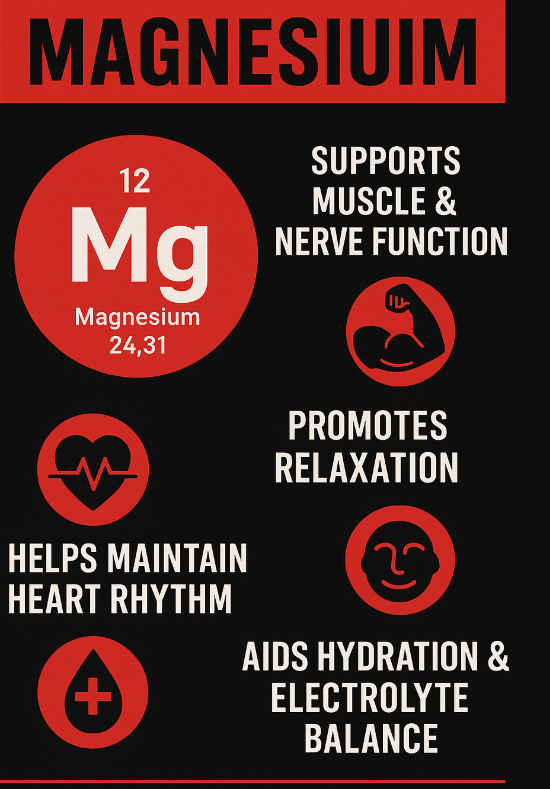
Magnesium: The Unsung Hero of Recovery, Resilience, and Detox
Share
If your body were a fire engine, magnesium would be the part that keeps the whole machine from rattling itself apart. It may not get the spotlight like glutathione or CoQ10, but without enough magnesium, your recovery, hydration, heart rhythm, sleep, and muscle function all start breaking down.
And here’s the truth: most first responders are running low.
Why Magnesium Is Essential — Especially for Physically Demanding Professions
Magnesium is involved in over 300 biochemical processes in the body — most of which keep your nerves firing, muscles working, heart beating, and brain stable. It’s especially critical when you’re under high physical or environmental stress.
And yet, studies show that up to 50% of Americans are magnesium deficient — even more so for those exposed to intense physical activity, shift work, caffeine, dehydration, and environmental toxins (NIH, 2021).
What Magnesium Does for You
Muscle Function & Cramp Prevention
Magnesium helps muscles contract and relax properly — preventing cramps, spasms, or that “twitchy” exhausted feeling after long shifts. It also supports ATP production, your body’s cellular energy.
Calms the Nervous System
Magnesium acts like a natural tranquilizer for your brain and nerves. It reduces the release of stress hormones and enhances GABA — the neurotransmitter responsible for relaxation and sleep.
Low magnesium = poor sleep, anxiety, and brain fog.
Regulates Heart Rhythm & Blood Pressure
Your heart depends on magnesium to beat steadily. It's essential for electrical conduction through the heart and maintaining blood pressure, especially under exertion or heat stress.
Supports Hydration & Electrolyte Balance
Magnesium works alongside sodium, potassium, and calcium to help move fluids in and out of your cells. Without it, no amount of Gatorade can fix cellular dehydration.
Detoxification and Inflammation Control
Magnesium is necessary for glutathione synthesis, and helps reduce oxidative stress from smoke, chemical exposure, or overtraining. It also helps reduce inflammation by calming immune response.
Why It Matters for First Responders
Firefighting, EMS, law enforcement, and military work all push your body to its physiological edge. And every edge you push — whether it's heat, smoke, overexertion, sleep deprivation, or mental stress — burns through magnesium.
Replenishing magnesium helps you:
- Avoid cramps and fatigue during long shifts
- Sleep deeper and recover faster
- Stay calm under pressure
- Maintain stable hydration and blood pressure
- Support your liver’s detox function
🧠 Clinical Sources
-
NIH on Magnesium Deficiency and Function
NIH Office of Dietary Supplements -
Magnesium and stress resilience
Nutrients Journal, 2020: Magnesium and Central Nervous System -
Magnesium and glutathione synthesis
BioFactors Journal, 2011
Final Word
You don’t have to feel burnt out to be depleted.
Magnesium is one of the first things your body loses when you sweat, stress, or push yourself hard — and one of the most important things to replenish if you want to perform, recover, and protect your future health.
At 3rd Alarm Nutrition, we include magnesium because it’s not just about detox — it’s about staying durable in a job that demands it all.